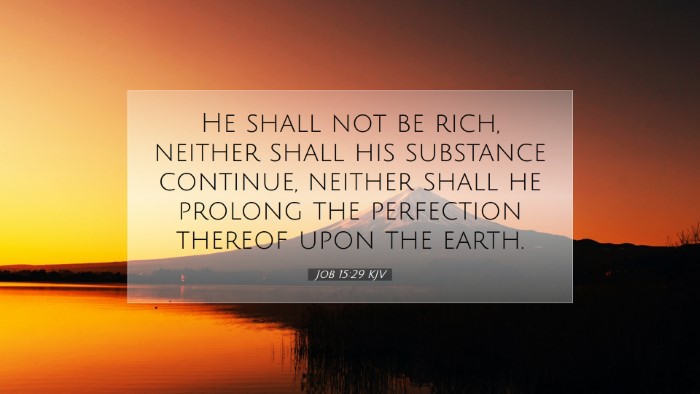Commentary on Job 15:29
Job 15:29: "He shall not be rich, neither shall his substance continue, neither shall he prolong the perfection thereof upon the earth."
Introduction
The verse from Job 15:29 speaks to the themes of wealth, prosperity, and the divine justice that underpins the existence of the righteous and the wicked. In this commentary, we will delve into the interpretations of this verse by examining insights from prominent public domain commentaries, specifically those by Matthew Henry, Albert Barnes, and Adam Clarke. Each commentator offers unique perspectives, enriching the understanding of this verse while providing meaningful insights for pastors, students, and theologians alike.
Contextual Overview
Job 15 occurs in a debate between Job and his friend Eliphaz. Eliphaz represents a traditional view of suffering and divine retribution, suggesting that suffering is a direct result of sin. The passage suggests that the wicked will not flourish or maintain their wealth. This theme resonates throughout the Book of Job, which grapples with the complexity of suffering and the character of God.
Insights from Matthew Henry
Matthew Henry emphasizes the certainty of divine judgment against the wicked. He writes that the wealthy who are wicked will not find lasting prosperity. In this commentary, he highlights several key points:
- Temporal Wealth: Henry argues that wealth is fleeting for those who are not righteous. The wicked may appear to prosper temporarily, but ultimately their substance will not endure.
- Divine Justice: The verse serves as a reminder of the eventual judgment of God, indicating that the wicked will be stripped of their riches, reinforcing the principle that "the eyes of the Lord are upon the righteous, and His ears are open to their cries" (Psalm 34:15).
- Spiritual Implication: The loss of substance correlates with the spiritual bankruptcy of the wicked. Hence, while they may enjoy worldly gain, their spiritual state leads to inevitable loss.
Insights from Albert Barnes
Albert Barnes provides a detailed analysis of Job 15:29, focusing on the nature of wealth and its limitations:
- Wealth and Stability: Barnes asserts that while the wicked may accumulate wealth, their capacity to retain it is uncertain. He points out that wealth without a foundation of righteousness is akin to a house built on sand.
- Discontentment of the Wicked: He notes that the wicked are often unable to enjoy their gains fully, as their hearts are filled with discontent and anxiety, leaving them spiritually impoverished despite their material wealth.
- Certainty of Decline: Barnes underscores the phrase "neither shall his substance continue," suggesting that all earthly goods are subject to decay and loss, reflecting the transient nature of life and the eventual arrival of divine retribution.
Insights from Adam Clarke
Adam Clarke’s commentary provides a theological reflection on the meaning behind the verse:
- Nature of Wealth: Clarke cautions that wealth is often a temporary blessing and that those who do not acknowledge God's sovereignty will find it slipping away. He highlights the illusion of security that accompanies material wealth.
- Character of God: He suggests that God’s governance of the universe involves a moral order, where the fate of the wicked ultimately aligns with divine justice. Clarke emphasizes that the apparent prosperity of the wicked is a test of faith for the righteous.
- Hope for the Righteous: Clarke assures the faithful that while injustice may seem prevalent, God’s judgment will eventually prevail, offering hope to the suffering and encouraging perseverance in faith.
Theological Implications
This verse presents several theological implications that theologians and Bible scholars should consider:
- The Nature of God: The depiction of God as a divine arbiter of justice prompts reflection on His character. The assurance that God does not allow the wicked to flourish suggests an unwavering moral order.
- Human Responsibility: This verse emphasizes human responsibility concerning wealth and morality. Wealth can either be a blessing or a curse depending on one’s relationship with God.
- Suffering and Justice: The interplay of suffering and divine justice raises challenging questions for scholars in theodicy. The verse indirectly supports the notion that God ultimately respects justice, calling for a nuanced understanding of suffering in the believer's life.
Application for Pastors and Students
The insights drawn from Job 15:29 can be significant for pastoral ministry and theological education:
- Teaching on Wealth: Pastors may use this verse to teach about the temporary nature of wealth and the necessity of focusing on eternal values. It highlights the need for congregants to seek a relationship with God over material possessions.
- Encouragement in Suffering: This verse offers reassurance to those suffering that apparent injustice will not last forever. Pastors can draw from this for counseling, providing hope to those enduring hardship.
- Building Moral Character: With this teaching, educators can emphasize the ethical dimension of wealth management and the importance of aligning personal and communal financial decisions with biblical morality.
Conclusion
Job 15:29, with its rich commentary from theologians like Matthew Henry, Albert Barnes, and Adam Clarke, reflects key aspects of divine justice and the nature of wealth. As believers navigate the complexities of life, this verse serves as a profound reminder of the transient nature of material wealth and the enduring nature of spiritual righteousness. It invites pastors and scholars to deepen their understanding of God’s character, the moral ramifications of human actions, and the reassurance of God’s ultimate justice.


